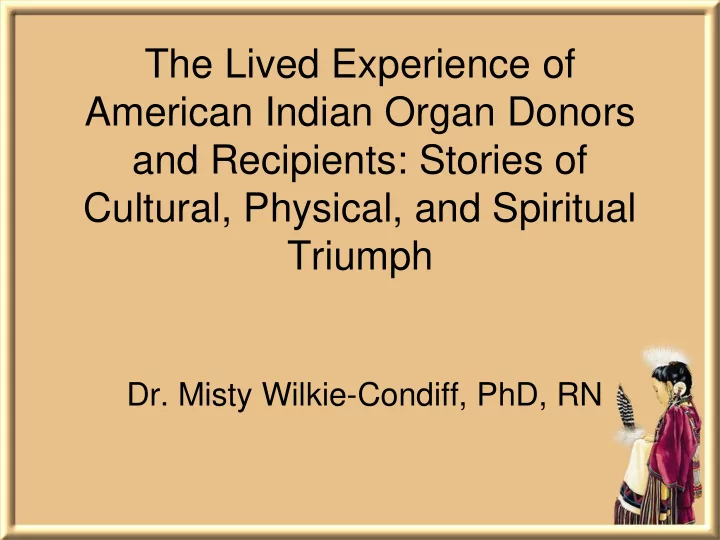

The Lived Experience of American Indian Organ Donors and Recipients: Stories of Cultural, Physical, and Spiritual Triumph Dr. Misty Wilkie-Condiff, PhD, RN
Statistics for American Indians • 5.2 million American Indian and Alaska Natives • 2% of the US population • 566 federally recognized American Indian tribes • 30% live in poverty (US national average is 15%)
Cultural Factors • Family oriented • Strong connection to reservation and other American Indians • May struggle with traditional vs. religious beliefs • Traditional belief of body needing to remain whole • Indian Health Service contract health issues • Deceased organ donation is rarely done
Background • ½ of American Indian (AI) adults are diagnosed with diabetes • AI are 3.5 times more likely to have end-stage renal disease • Minorities make up 58% of the transplant waiting list in the US • There are over 1,000 AI waiting for organs
Literature Says…. • American Indians are not willing to be organ donors • Diabetes has reached epidemic proportions in American Indians • American Indians are more likely have ESRD requiring dialysis than other races • American Indians wait longer on transplant waiting lists compared to other populations
Methodology • Phenomenology - Both a philosophy and method - Utilized van Manen’s Lifeworld Existentials of lived body, lived time, lived space, and lived relationality as a priori codes - Synthesized data so readers can see, feel, hear, experience what participants are describing
Data Collection Procedures • Participants recruited through community fliers, newspapers, radio • Informational letter sent to participants with questions to reflect on prior to interview • Semi-structured interviews lasted 40- 100 minutes • Encouraged to tell their story in a temporal aspect
Participant Demographics • Enrolled members of Ojibwe tribes, 6 females and 4 males • Ages ranged from 29 to 72 at the time of interview • 4 donors and 6 recipients • All lived on home reservation except one • All were of Christian faith or traditional practitioners
Findings for Donors • Lived Body • I Hope We’re Compatible • Reflecting on Recovery since Organ Donation • No Regrets about Giving the Gift of Life
Findings for Donors • Lived Relationality • You Don’t Need to Ask Me to be the Donor – I’m the Caregiver, I’ll Donate • Broken Body, Broken Spirit – Healed by One Donation • Sharing My Experience with Others
Findings for Donors • Lived Space • Overwhelming Fear and Anxiety • We Live More than a Mile Away
Findings for Donors • Lived Time • Waiting
“I would tell [other potential donors] to look into it more about how they feel about it. Emotionally, spiritually —it’s a good gift and a person who is giving it I commend them on what they do because they actually give another individual a second chance to maybe correct some of the things in the rest of the life that the patient might have… I wouldn’t change any of the things that I ever did, even the surgery. The surgery did turn out good things. It might not have turned out the best things for [brother/recipient] but it actually turned out good for me. Between here and that time I would never have changed anything but it got me —it gave me my second chance.” – Donated to brother
Findings for Recipients • Lived Body • Sick of Being Sick – Finding a New “Normal” • Relying on AI Tradition • Hopelessness to Hope-Filled • Another Chance at a New Life • Fearing Rejection
Findings for Recipients • Lived Relationality • Family and Community Support • Relying on Health Care Team and God
Findings for Recipients • Lived Space • Staying Spiritually Connected • Accepting Reality – Living Life to the Max
Findings for Recipients • Lived Time • Waiting
“ The day before [surgery] was a hard night. I will always remember that night before… I didn’t get much sleep, you know thinking about a thousand things…[but now] one thing that always sticks in my mind is that a kidney will last for about 15 years from transplant time. Eventually I will have kidney failure again. I think about that from time to time. I know when the time comes, when that day comes, it will be hard to prepare for that. I try not to think about it but again I have to think about it once in a while. Who knows how long I will be here?” – Received kidney from brother
Limitations • Lack of generalizability due to the use of phenomenology • Study sample only included enrolled members of Ojibwe tribes
Implications for Practice • Participants were grateful for care provided by nursing staff, including patient education • Nurses can be confident when approaching AI about organ donation • Awareness of culture and employment of AI nurses in transplant programs would help increase the number of AI willing to be donors
Future Research • Follow up with current quality of life after organ donation and transplantation • Study AI families that have participated in the decision to donate a deceased loved one’s organs • Replicate study with other tribes and indigenous peoples • Study potential organ donors and recipients and their decision-making process • Study issues related to deceased organ donation in AI communities
Contact Information: Misty Wilkie-Condiff, PhD, RN mcondiff@bemidjistate.edu
Recommend
More recommend